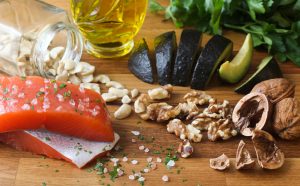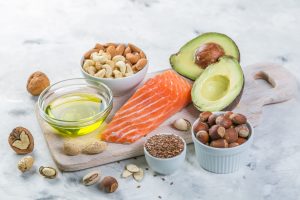 An essential part of a heart healthy diet is plenty of plant-based unsaturated fats. Not only do plant-based foods provide heart-healthy fiber, but they are also rich in antioxidants. These antioxidants can help reduce inflammation in the body, and in turn reduce chronic disease risk. One such group of antioxidants are the omega-3 fatty acids found in such foods as avocado, plant-based oils and fatty fish. Recent research shows that these healthy fats may be able to help with mental health. A recent study shows that by increasing the amount of healthy fats in your diet, you could help reduce symptoms of anxiety.
An essential part of a heart healthy diet is plenty of plant-based unsaturated fats. Not only do plant-based foods provide heart-healthy fiber, but they are also rich in antioxidants. These antioxidants can help reduce inflammation in the body, and in turn reduce chronic disease risk. One such group of antioxidants are the omega-3 fatty acids found in such foods as avocado, plant-based oils and fatty fish. Recent research shows that these healthy fats may be able to help with mental health. A recent study shows that by increasing the amount of healthy fats in your diet, you could help reduce symptoms of anxiety.
What are healthy fats?
Healthy fats typically describe the group of fats known as unsaturated fats. These fats can be found in plant-based foods such as avocado, nuts, and seeds. They can also be found in plant-based oils like olive oil and fatty fish like salmon and trout. Research shows that by replacing some of your saturated fat intake with unsaturated fats, you can benefit heart health. The cause of this is still unknown, but it is suggested that it may be due to the fiber and antioxidants in such unsaturated food sources.
Healthy fat intake and anxiety
A recent meta-analysis study looked at research done on omega-3 fatty acid supplementation and mental health. Study results show that those with clinically diagnosed anxiety may benefit from treatment with omega-3 fatty acids. This is because treatment with such fats seemed to reduce symptoms of anxiety under stressful situations. Even those who suffered from other diagnosed mental health conditions outside of clinical anxiety showed reduced anxiety symptoms after such treatment.
Although more research needs to be done to confirm such findings, these results are promising for future potential treatment options for anxiety. In the meantime, it can’t hurt to add in more healthy fats to your daily diet. Also, an omega-3 fatty acid supplement could be helpful to healthy of the body and mind. An example of such a supplement is fish oil like that by Vita Sciences. This formula by Vita Sciences provides 400 milligrams of EPA and 300 milligrams of DHA, which are omega-3 fatty acids found in cold water fish. This supplement is a great way to get your healthy fats if you don’t think you will be able to get them in every day in your diet.
Other ways to help reduce anxiety
Besides increasing healthy fats in your diet, there are other ways you can work to reduce anxiety in your daily routine.
- Make sure to sleep enough each day: The average adult should receive at least 7 to 9 hours of sleep every night. Sleep is important not just for energy levels, but for regulating fluid, hormones, and blood pressure in the body. Lack of sleep can also increase risk of anxiety and stress levels, especially in those that already suffer from anxiety. If you have trouble sleeping, visit the National Sleep Foundation website for tips. You should also visit your healthcare provider if you find that your sleep problems become a long-term problem. This is because you may be suffering from a condition known as sleep apnea that can affect quality of sleep and breathing. A healthcare provider can also help you manage pain, urinary incontinence, or insomnia that can impact sleep quality and quantity.
- Talk to someone: Talking to a health care professional like a therapist or counselor can help you come up with strategies for dealing with your stress or anxiety. Even just talking to a friend or loved one may be helpful to get worries off your mind.
- Find time to relax: Try to set aside at least 15 minutes a day to relax. This relaxing could include relaxation breathing, diffusing calming essential oils like lavender, or engaging in activities like yoga or meditation.
- Volunteer in your community: Helping others in your community may be able to increase your sense of purpose and help you meet others with similar interests. In turn, these factors may help lower your stress and anxiety levels over time.
- Stay active: Regular exercise each day can help reduce anxiety levels. This may be due to the vitamin D you get from working out in the sunshine. Also, it could be from the serotonin your body releases when you exercise. Either way, get moving each day and it can make you feel better inside and out.
-written by Staci Gulbin, MS, MEd, RD
References:
Harvard Health Publishing: Harvard Medical School (August 13, 2018) “The truth about fats: the good, the bad, and the in-between.” https://www.health.harvard.edu/staying-healthy/the-truth-about-fats-bad-and-good
Lattari, E., Budde, H., Paes, F., Neto, G. A. M., Appolinario, J. C., Nardi, A. E., … Machado, S. (2018). Effects of Aerobic Exercise on Anxiety Symptoms and Cortical Activity in Patients with Panic Disorder: A Pilot Study. Clinical Practice and Epidemiology in Mental Health : CP & EMH, 14, 11–25. http://doi.org/10.2174/1745017901814010011
National Sleep Foundation (accessed September 18, 2018) “How Much Sleep Do We Really Need?” https://www.sleepfoundation.org/how-sleep-works/how-much-sleep-do-we-really-need
Nauert, PhD, R. (accessed September 18, 2018) “Sleep Loss Increases Anxiety-Especially Among Worriers.” https://psychcentral.com/news/2013/06/27/sleep-loss-increases-anxiety-especially-among-worriers/56531.html
Su K, Tseng P, Lin P, et al. Association of Use of Omega-3 Polyunsaturated Fatty Acids With Changes in Severity of Anxiety SymptomsA Systematic Review and Meta-analysis. JAMA Network Open.2018;1(5):e182327. doi:10.1001/jamanetworkopen.2018.2327
 The Greek-style diet has long been touted as one that is full of heart healthy benefits. These benefits are thought to stem from the vast array of healthy fats from plant-based sources and limiting of saturated fats from red meats as well as the rich source of fruits and vegetables in this Mediterranean regimen. However, the health benefits may extend much further than initially realized. A recent study shows that the Mediterranean diet may help to lengthen life of older adults.
The Greek-style diet has long been touted as one that is full of heart healthy benefits. These benefits are thought to stem from the vast array of healthy fats from plant-based sources and limiting of saturated fats from red meats as well as the rich source of fruits and vegetables in this Mediterranean regimen. However, the health benefits may extend much further than initially realized. A recent study shows that the Mediterranean diet may help to lengthen life of older adults. Heart disease is the leading cause of death for men and women in the United States. It accounts for one in four deaths each year. However, yo can prevent heart disease by changing some lifestyle factors to lower your risk. Risk factors of heart disease include poor diet, physical inactivity, being overweight or obese, being a smoker, and having diabetes. Fortunately, by working to change a few things in your daily routine, you can lower your risk of heart disease. Here are the top five things you can do today to lower your risk of heart disease.
Heart disease is the leading cause of death for men and women in the United States. It accounts for one in four deaths each year. However, yo can prevent heart disease by changing some lifestyle factors to lower your risk. Risk factors of heart disease include poor diet, physical inactivity, being overweight or obese, being a smoker, and having diabetes. Fortunately, by working to change a few things in your daily routine, you can lower your risk of heart disease. Here are the top five things you can do today to lower your risk of heart disease.
 Heart disease is the number one cause of death for both mean and women in the United States. Therefore, it is no surprise that researchers are looking endlessly for ways to reduce risk of this condition. A recent study has found that for those with diabetes, the earlier diagnosis, the lower the heart disease risk later on in life.
Heart disease is the number one cause of death for both mean and women in the United States. Therefore, it is no surprise that researchers are looking endlessly for ways to reduce risk of this condition. A recent study has found that for those with diabetes, the earlier diagnosis, the lower the heart disease risk later on in life. Like millions of other people, you may be hoping to lose some weight in this new year. However, the confusing part may be what eating plan, or shall I say “diet,” should you choose to follow? There is so much information in the media today making all sorts of weight loss claims. They may all seem promising, but not all may provide you the nutrients you need to succeed long-term. However, a recent report found that the DASH diet may be the answer to get you to your weight loss goal.
Like millions of other people, you may be hoping to lose some weight in this new year. However, the confusing part may be what eating plan, or shall I say “diet,” should you choose to follow? There is so much information in the media today making all sorts of weight loss claims. They may all seem promising, but not all may provide you the nutrients you need to succeed long-term. However, a recent report found that the DASH diet may be the answer to get you to your weight loss goal. If you have ever tried to lose weight, then you probably have been told to track your calories. Most calorie trackers focus on keeping track of the calories you consume through food. On the other hand, fitness trackers or workout machines may track how many calories you burn during the day. However, is there more to the story of weight loss, or is calories in and calories out the only key to success? A recent report by health experts reveal that there may be more than simple math in the weight loss equation.
If you have ever tried to lose weight, then you probably have been told to track your calories. Most calorie trackers focus on keeping track of the calories you consume through food. On the other hand, fitness trackers or workout machines may track how many calories you burn during the day. However, is there more to the story of weight loss, or is calories in and calories out the only key to success? A recent report by health experts reveal that there may be more than simple math in the weight loss equation. According to the National Institutes of Health, the average American can live an average of 79 years. However, did you know that a few small lifestyle changes could add years to your life? It was found that for every few pounds you lose you could be adding years to your life.
According to the National Institutes of Health, the average American can live an average of 79 years. However, did you know that a few small lifestyle changes could add years to your life? It was found that for every few pounds you lose you could be adding years to your life. Do you skip breakfast? Does your busy schedule make it hard to eat in the morning? Are you just not hungry in the early hours of the day? You may have heard that breakfast is the most important meal of the day. Recent research has found that this may be true. Skipping your morning meal can deprive your body of many important nutrients vital to overall health.
Do you skip breakfast? Does your busy schedule make it hard to eat in the morning? Are you just not hungry in the early hours of the day? You may have heard that breakfast is the most important meal of the day. Recent research has found that this may be true. Skipping your morning meal can deprive your body of many important nutrients vital to overall health.